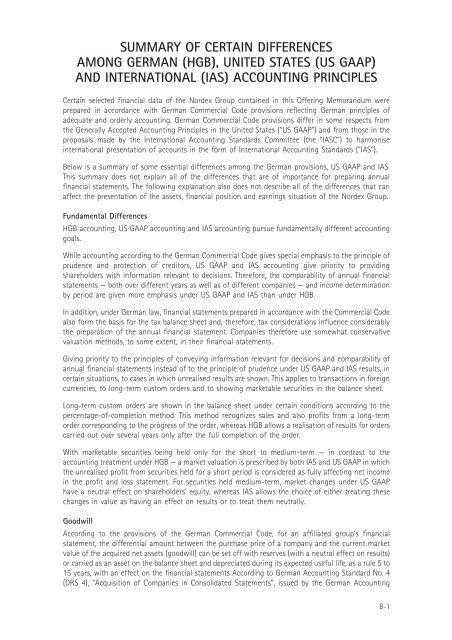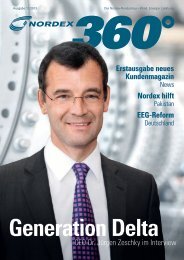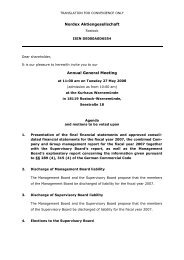OFFERING MEMORANDUM Global Offering of up to ... - Nordex
OFFERING MEMORANDUM Global Offering of up to ... - Nordex
OFFERING MEMORANDUM Global Offering of up to ... - Nordex
You also want an ePaper? Increase the reach of your titles
YUMPU automatically turns print PDFs into web optimized ePapers that Google loves.
SUMMARY OF CERTAIN DIFFERENCES<br />
AMONG GERMAN (HGB), UNITED STATES (US GAAP)<br />
AND INTERNATIONAL (IAS) ACCOUNTING PRINCIPLES<br />
Certain selected financial data <strong>of</strong> the <strong>Nordex</strong> Gro<strong>up</strong> contained in this <strong>Offering</strong> Memorandum were<br />
prepared in accordance with German Commercial Code provisions reflecting German principles <strong>of</strong><br />
adequate and orderly accounting. German Commercial Code provisions differ in some respects from<br />
the Generally Accepted Accounting Principles in the United States (‘‘US GAAP’’) and from those in the<br />
proposals made by the International Accounting Standards Committee (the ‘‘IASC’’) <strong>to</strong> harmonise<br />
international presentation <strong>of</strong> accounts in the form <strong>of</strong> International Accounting Standards (‘‘IAS’’).<br />
Below is a summary <strong>of</strong> some essential differences among the German provisions, US GAAP and IAS.<br />
This summary does not explain all <strong>of</strong> the differences that are <strong>of</strong> importance for preparing annual<br />
financial statements. The following explanation also does not describe all <strong>of</strong> the differences that can<br />
affect the presentation <strong>of</strong> the assets, financial position and earnings situation <strong>of</strong> the <strong>Nordex</strong> Gro<strong>up</strong>.<br />
Fundamental Differences<br />
HGB accounting, US GAAP accounting and IAS accounting pursue fundamentally different accounting<br />
goals.<br />
While accounting according <strong>to</strong> the German Commercial Code gives special emphasis <strong>to</strong> the principle <strong>of</strong><br />
prudence and protection <strong>of</strong> credi<strong>to</strong>rs, US GAAP and IAS accounting give priority <strong>to</strong> providing<br />
shareholders with information relevant <strong>to</strong> decisions. Therefore, the comparability <strong>of</strong> annual financial<br />
statements — both over different years as well as <strong>of</strong> different companies — and income determination<br />
by period are given more emphasis under US GAAP and IAS than under HGB.<br />
In addition, under German law, financial statements prepared in accordance with the Commercial Code<br />
also form the basis for the tax balance sheet and, therefore, tax considerations influence considerably<br />
the preparation <strong>of</strong> the annual financial statement. Companies therefore use somewhat conservative<br />
valuation methods, <strong>to</strong> some extent, in their financial statements.<br />
Giving priority <strong>to</strong> the principles <strong>of</strong> conveying information relevant for decisions and comparability <strong>of</strong><br />
annual financial statements instead <strong>of</strong> <strong>to</strong> the principle <strong>of</strong> prudence under US GAAP and IAS results, in<br />
certain situations, <strong>to</strong> cases in which unrealised results are shown. This applies <strong>to</strong> transactions in foreign<br />
currencies, <strong>to</strong> long-term cus<strong>to</strong>m orders and <strong>to</strong> showing marketable securities in the balance sheet.<br />
Long-term cus<strong>to</strong>m orders are shown in the balance sheet under certain conditions according <strong>to</strong> the<br />
percentage-<strong>of</strong>-completion method. This method recognizes sales and also pr<strong>of</strong>its from a long-term<br />
order corresponding <strong>to</strong> the progress <strong>of</strong> the order, whereas HGB allows a realisation <strong>of</strong> results for orders<br />
carried out over several years only after the full completion <strong>of</strong> the order.<br />
With marketable securities being held only for the short <strong>to</strong> medium-term — in contrast <strong>to</strong> the<br />
accounting treatment under HGB — a market valuation is prescribed by both IAS and US GAAP in which<br />
the unrealised pr<strong>of</strong>it from securities held for a short period is considered as fully affecting net income<br />
in the pr<strong>of</strong>it and loss statement. For securities held medium-term, market changes under US GAAP<br />
have a neutral effect on shareholders’ equity, whereas IAS allows the choice <strong>of</strong> either treating these<br />
changes in value as having an effect on results or <strong>to</strong> treat them neutrally.<br />
Goodwill<br />
According <strong>to</strong> the provisions <strong>of</strong> the German Commercial Code, for an affiliated gro<strong>up</strong>’s financial<br />
statement, the differential amount between the purchase price <strong>of</strong> a company and the current market<br />
value <strong>of</strong> the acquired net assets (goodwill) can be set <strong>of</strong>f with reserves (with a neutral effect on results)<br />
or carried as an asset on the balance sheet and depreciated during its expected useful life, as a rule 5 <strong>to</strong><br />
15 years, with an effect on the financial statements According <strong>to</strong> German Accounting Standard No. 4<br />
(DRS 4), ‘‘Acquisition <strong>of</strong> Companies in Consolidated Statements’’, issued by the German Accounting<br />
B-1












